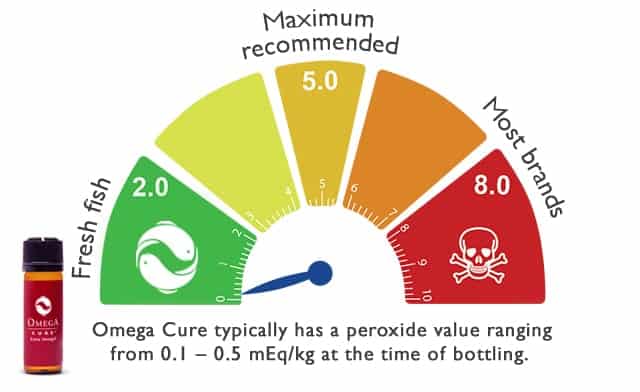Is Rancid Fish Oil Safe to Consume?
Think about fish oil. If your gut reaction is “yuck,” you are in good company.
Whether it’s from remembering Grandma’s cod liver oil or taking those horse-pills in the cupboard, most people believe that a fish oil supplement ought to taste bad. We put up with the unpleasant fish oil smell and taste because…well, it’s hard to argue with the health benefits noted in thousands of research studies.
But the truth is that high-quality omega-3 products shouldn’t taste like yesteryear’s salmon. If your current fish oil products smell super fishy – or give you nauseating burps throughout the day – you may have rancid oil on your hands.
Why Does Fish Oil Go Bad Quickly?
As seafood lovers know, fish spoils more easily than other foods if not kept cold or consumed quickly. The same goes for fish oil.
The reason fish and fish oil spoil quickly is that they are rich sources of omega-3 polyunsaturated fatty acids. Known for their anti-inflammatory benefits, omega-3s are characterized by their large numbers of reactive double bonds. While this chemical structure makes the omega-3s extremely flexible and responsive in the cell, the same trait also explains why these fatty acids are so vulnerable to the effects of oxygen.
As fish oil oxidizes, new byproducts begin to form in the oil called lipid peroxides, aldehydes and ketones. These oxidation byproducts are what give off the unpleasant smell and taste of spoiled fish.
The rate at which the omega-3 molecules oxidize depends on a number of factors, including how the fish were harvested, how the oil was processed, and the oil’s exposure to oxygen thereafter. But once an oil has started to oxidize, there is no going back. At that point, it’s simply a matter of time before the oil goes rancid and counteracts the benefits of omega-3 fish oil.

Store Cold: Storing fish oil appropriately can help protect against spoilage and lengthen the shelf life. Store your fish oil products in a cool, dry place where they won’t get much light – like the refrigerator.
Rancid Fish Oil Effects Are Cause for Concern
Aside from tasting and smelling bad, rancid fish oil supplements are likely less effective than fresh fish oil. Because oxidized omega-3 molecules have a different chemical shape and reactivity than their unoxidized fatty acid counterparts, they may not be able to carry out the same functions in the cell.
Can Rancid Fish Oil Make You Sick?
Rancid fish oil isn’t going to give you food poisoning or make you sick the way eating spoiled fish or meat would. But many scientists believe that consuming rancid fish oils could be negative in the long term.
Two comparative studies to date showed that consuming rancid fish oil increased bad cholesterol levels. And in animal studies, oxidized fatty acids have been found to cause organ damage, inflammation, and atherosclerosis, among other problems.
This is why it’s critical to consider the freshness level of your omega-3 supplement, whether it’s made from fish oil, krill oil or algae.
Unfortunately, independent studies from Canada, New Zealand, Norway, South Africa, and more have discovered that the majority of over-the-counter omega-3 supplements exceed recommended oxidation limits, long before the products’ supposed expiration date.
How to Combat Rancidity in 5 Easy Steps
While rancid oil is unfortunately common, fresh fish oil can provide consumers with a relatively inexpensive, safe way to improve health. Some of the most commonly cited benefits of getting enough omega-3 fatty acids include: lowering triglyceride levels and blood pressure, improving joint comfort and mobility, and improving focus and mental health.
To ensure optimal benefits, seek out a high-quality fish oil product by doing the following:
Step 1: Evaluate Your Current Product
When assessing fish oil, put your products through the taste and smell test. Truly fresh fish oil has little fishy taste or smell, just like fresh fish.
Putting fish oil into capsules is an effective way to cover up poor quality oil. So if you have fish oil capsules, break them open. If your nose catches a pungent fishy smell, it’s time to throw your capsules away.
Liquid omega-3 supplements also go bad with time and exposure to oxygen. So if your liquid fish oil or cod liver oil smells and tastes bad, get something else.
Rancidity is something you can taste and smell. In this video, a tasting panel compares Omega Cure® with a krill oil, prenatal omega-3 supplement, and fish oil capsule. See how they do and try it yourself at home!
Step 2: Make Smart Purchases
Fish oil is a food substance that’s perishable, just like milk or seafood. To a certain degree, it can be stabilized, but beware of dietary supplements that have two- or three-year expiration dates. If your product has been sitting in your medicine cabinet for many years, it’s almost certainly rancid.
Step 3: Check Your Fish Oil’s Oxidation Values
How oxidized an omega-3 product is can be measured by looking at its oxidation values, better known as the peroxide, anisidine, and TOTOX levels.
The peroxide value indicates the amount of lipid peroxides that have formed in the oil, while the anisidine value measures the levels of secondary oxidation byproducts, like aldehydes. The TOTOX value, which is calculated based on the peroxide and anisidine values combined, provides a more complete picture of the freshness level of the oil.
Typically, the lower the peroxide, anisidine, and TOTOX numbers are, the fresher the oil. The highest quality oils will have a TOTOX number below 5. You can learn more about how to interpret these numbers here.
These measurements provide an excellent, scientific way to determine rancidity. If your fish oil brand doesn’t showcase their oxidation values, be sure to request them!
Remember though: Oxidation levels provide a snapshot of the oil’s freshness level the moment they are measured. A fish oil supplement’s oxidation values can be many times higher by the time it reaches the consumer. That’s why it’s important to put the other tips listed here into practice as well.

Peroxide and anisidine values are two key freshness measurements.
Step 4: Keep It Cold
Low temperatures slow down the enzymatic time bomb that is ticking away. So freezing or refrigerating fish oil will help it keep fresh for longer.
Step 5: Use It or Lose It
When buying fish oil, look for small containers, not supersized bottles. The longer a fish oil is stored, the greater the chance it will oxidize over time.
Similarly, use up your omega-3 product in a timely manner. Often, people think they’re saving money by keeping old capsules or bottles of oil. But you wouldn’t keep old fish in your refrigerator. Think of fish oil supplements in the same way and throw old products out.
Omega Cure: Fresh Liquid Fish Oil
At Omega3 Innovations, we’ve been crafting superior quality omega-3 supplements for almost two decades. Over the years, we’ve noticed how freshness equals potency and makes it easier for people to get good results.
That’s why we’re dedicated to manufacturing the best liquid fish oil with a fraction of the oxidation levels of other omega-3 supplements on the market.
If you’re interested in a more enjoyable omega-3 experience, discover Omega Cure Extra Strength. Developed by physicians from Norway, it’s got the freshness and potency to help you meet your wellness goals today.
Try Exceptionally Fresh Omega Cure
Experience the Omega3 Innovations difference for yourself with the most effective fish oil supplement on the market.
Buy Now
Popular posts



Related posts







